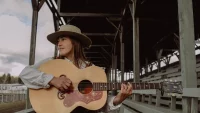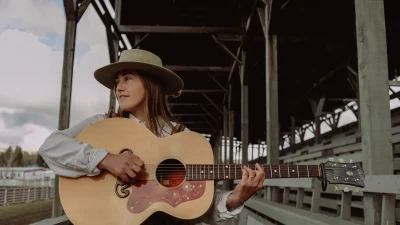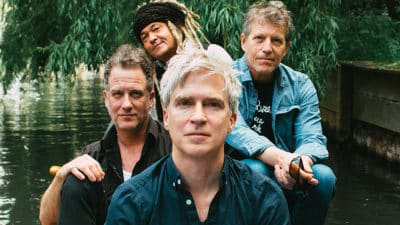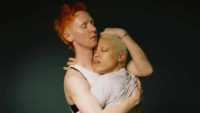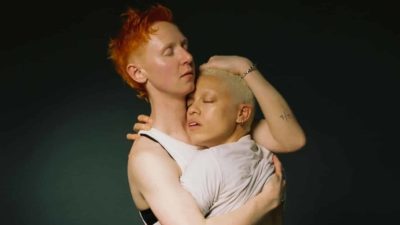Theatre
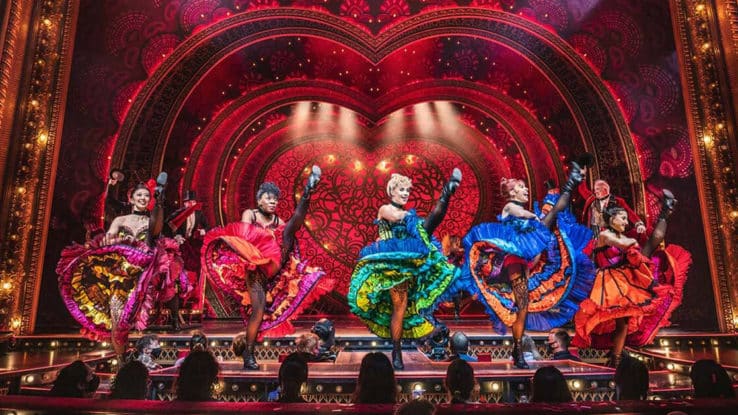
Interview
Selecting modern pop songs for Moulin Rouge! The Musical
Music supervisor and orchestrator Justin Levine talks updating the beloved soundtrack for the stage
Jukebox musicals are huge on the West End right now. Tina Turner, Bob Marley and The Drifters all have their own productions. Mamma Mia, featuring ABBA’s greatest hits, has run for over twenty years and remains one of London’s most popular shows. In the last few years we also saw the opening of & Juliet, an explosive pop-filled bonanza of a show that tips a hat to the work that Baz Luhrmann did on Moulin Rouge over two decades before.
Moulin Rouge! The Musical is neither your average film-to-stage adaptation nor your tried-and-tested jukebox musical. The original soundtrack is a creative tapestry of popular music and enduring tunes, beloved by fans and not easily undone. As the successful Broadway production moves to the West End, music supervisor and orchestrator Justin Levine discusses the unique challenge of selecting new songs for the show.
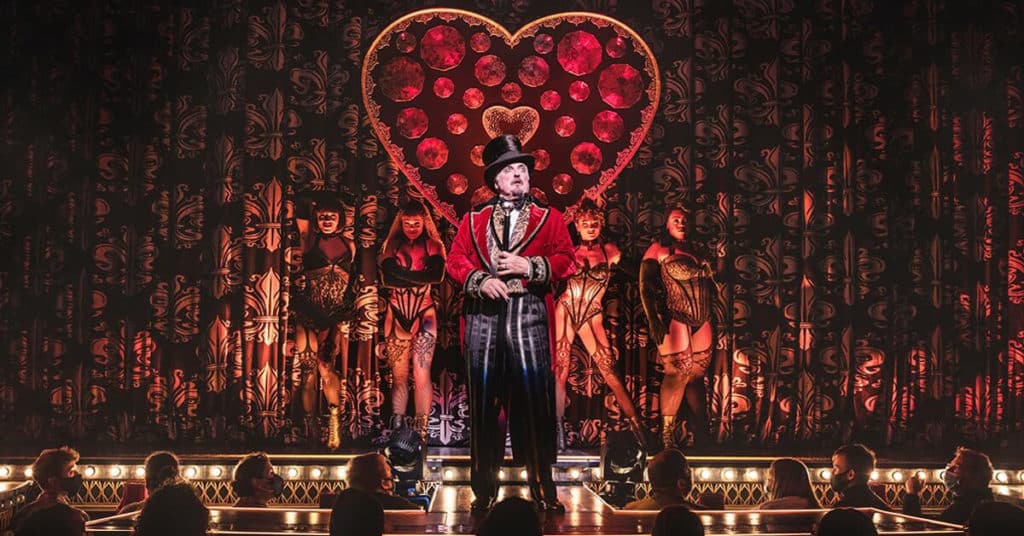
What were your requirements when choosing those new additions? Did you have a checklist in mind, or baseline criteria they had to meet?
Well, it was sort of a combination of criteria there. One was that the lyrics had to function similarly to how they do in a completely original musical. So the lyrics had to feel as if they could live inside of the mouths of these characters. They also needed to – in many cases, not in all – be recognizable, as one of the main tools of using music in this show is to build off of what is already the legacy of what the songs mean to every person who sees the it. And then in other cases, I was also really interested in bringing in music that perhaps some of the audience hadn’t heard before, or maybe hadn’t heard in that way.
I had a personal guiding principle, which was that I wanted the songs to feel timeless, so I was much more inclined to search for what I would call contemporary classics. I mean, I added a lot of music to this show that predates the release of the movie. So it wasn’t solely a mission to modernize or update. But for the songs that did come out after the movie, I was really interested in these contemporary classics, meaning the types of songs that you might not actually know when it came out because of how enduring the legacy is.
That huge opening number – talk me through that process of putting that together and deciding what was going to go in.
We knew from the beginning that ‘Lady Marmalade’ was going to be the envelope, the handshake with the audience. You know, it’s such an iconic number from the film. But interestingly enough, upon rewatching the film, I realized that it’s not quite as heavily featured as you would think. For us, this was a great opportunity to lean a bit more into that number.
I think the idea was very much that this was going to function along the same lines as ‘Willkommen’ (Cabaret), or also, in some ways ‘Tradition’ (Fiddler On The Roof) in that it’s really you have this interlocutor introducing the audience to the world and to the cross section of the society of Paris in 1899, and you meet some of the characters that you’re going to be living with for the next couple of hours. So that was that was the guiding principle, and then we wound up breaking it down section by section.
It’s interesting you say that you remember ‘Lady Marmalade’ featuring heavily. I think I probably would remember it the same way – the two are associated so much. I wanted to ask a little bit about that process of writing the ‘Elephant Love Medley’. I found it so interesting to listen to the film and then the stage version and see the changes you’d made.
Oh, yes, absolutely. I really love that moment in the movie. He’s throwing everything but the kitchen sink at Satine so that he can win her over, and in the film the conceit is that he sings these love songs to her, and then she sings those songs back, but rewrites the lyrics to refute his argument. What I wanted to do was give her a bit more agency to bring new songs into the medley. And so, we start the ‘Elephant Love Medley’ as it is in the film, so people are on board, they’re ready to go on this ride… and then it moves into this new direction as both Christian and Satine bring more songs into the mix.
The way I built it was, I gathered up sort of a mega list of songs. I printed up all the lyrics, and then I cut the paper by stanzas and then spliced it all together to make an argument. So that if you read the lyrics to the ‘Elephant Love Medley’ that we do, it’s a logical progression in an argument between these two lovers. Ultimately there are, I believe, 20 songs in in the medley. And that sort of hyperactive quality I think is right in line with the kinetic energy between these two people.
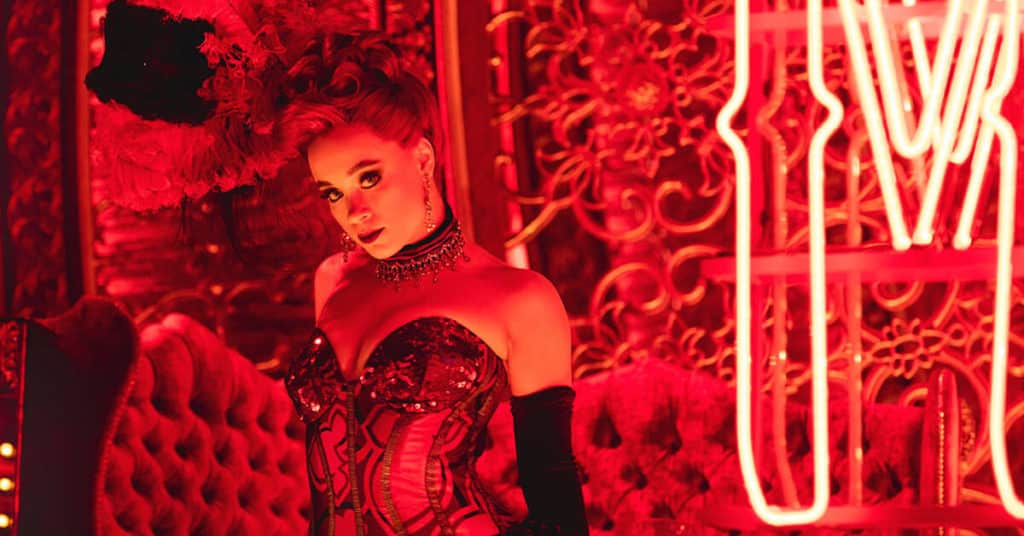
Most of the numbers are mashups, or amalgamations of quite a lot of different songs, but you have added some big numbers that just feature one song. ‘Firework’ and ‘Chandelier’ are the two that come to mind. What drew you to those songs in particular?
In the case of ‘Firework’, you know, this moment is a different moment than exists in the film. A lot of people associate that moment with ‘One Day I’ll Fly Away’, which has a very different sentiment than the Satine of the musical. She wants to actually stay, and she wants to save the club and save her family. And so, in this particular moment, there’s only one thing on her mind, which is that she has to successfully win the Duke over, so that he will invest in the club and so that the club can stay open. In that particular moment, it felt vital that whatever Satine sings, it’d be a song to pump herself up, when she’s clearly aware that she’s battling an illness, she’s also not sure that she has it in her to do this, and the stakes are higher than they’ve ever been.
I was really interested in exploring songs that you’ve typically heard in a very… I don’t know if ‘bubblegum pop’ is the right way to describe it, but just very hyper-produced pop style. I wanted to bring it all the way down, start on piano, introduce a little bit of strings, and then ultimately, the sort of the peak moment of the song would be this big, kind of operatic power ballad moment.
Pop songs function differently. Sometimes a pop song can be about one specific thing, it can be about one emotion, it can be about one moment, and it can sustain that examination for three minutes. In other cases, it’s a very slow burn. Take the Rolling Stones, for example: ‘I Can’t Get No Satisfaction’ – you know what that song is about one line into it. Whereas ‘You Can’t Always Get What You Want’ is a story song where it really sizzles throughout the entire thing and is building and building and building and building… And so in this particular case, it felt right to pick one song and really squeeze all the juice out of this one idea in this one moment, which is her just pumping herself up.
And ‘Chandelier’?
I love that song. I used to play in piano bars, so I was always memorizing lyrics to hundreds of songs. So I’m a big lyrics fiend. However, I would say that I’m probably music first, when it comes to what draws me into a pop song. And ‘Chandelier’ is such an earwig, it’s just gonna get stuck in there. I remember when that song came out, I just could not get that song out of my head. Really, it took me a while to figure out to learn what those lyrics were and what she’s talking about in that song. And so I thought that using it this way in the show was a great opportunity to a highlight those lyrics for the audience, but also make people hear the song in a very different way. That moment is a moment that Baz always refers to as ‘the knuckle’. It’s a turning point in the show
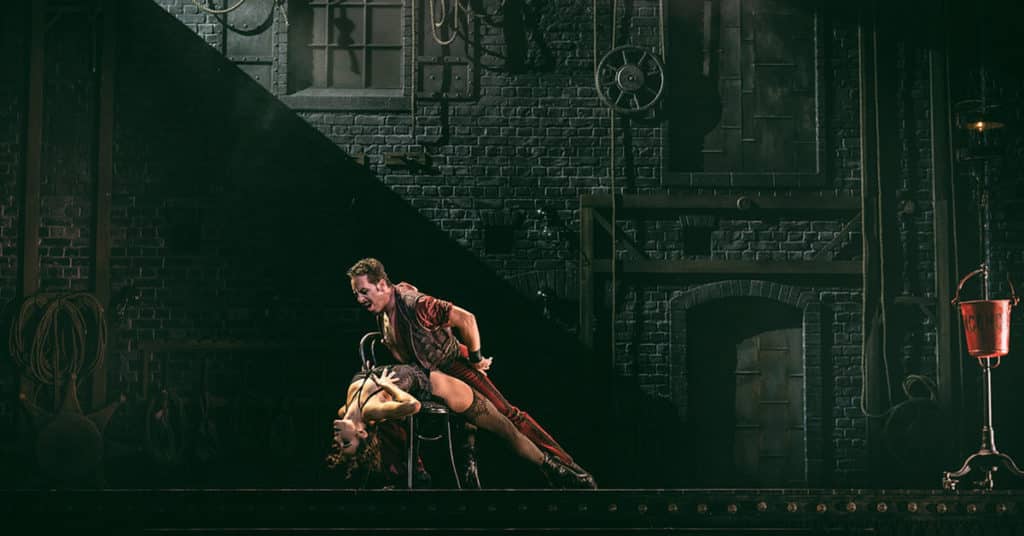
‘So Exciting! (The Pitch Song)’ is one that, again, changes quite drastically from the film. I imagine a lot of work went into making that what it is.
I really love ‘So Exciting! (The Pitch Song)’. It’s a moment that, I think, for me has a particular place in my heart because I wrote the lyrics to it. And it’s also the most traditional song in the show, as far as musical comedy is concerned.
I think that, again, that was a moment where our story changed, and we weren’t doing the fable that Baz did in the movie. So it had to be a different song. We did take the cue to include the can-can there. But I also thought it was a great opportunity to celebrate some of the French pop music of the first half of the 20th century with Edith Piaf. And then, of course, some of the other opera references that are in there.
What ended up being your favourite number in the show?
It changes. There have been times where it was the ‘Elephant Love Medley’. There are times where it’s ‘Backstage Romance’, there have been many times where it’s ‘Chandelier’. Although I will say that I think one of the most exciting and potent moments for me without fail is ‘Roxanne’. And I think that that is because one of the great joys of working on the show is collaborating with my dear friend and sister Sonya Tayeh, and her work on that number is just breath-taking to me. And I think the band sounds so good… In that moment, I think there’s such great work from my collaborators.
This show, unlike any other show I’ve ever worked on, required not only a village, but practically a country to put together. And that I was just very lucky to have such an amazing team. And that includes the team that helped get all of these songs – with few exceptions, we managed to get the vast majority of the songs that we wanted to use in the show. I’m just very grateful for that.
Moulin Rouge! The Musical is now booking at London’s Piccadilly Theatre until 7 Jan 2023. Get tickets here.




